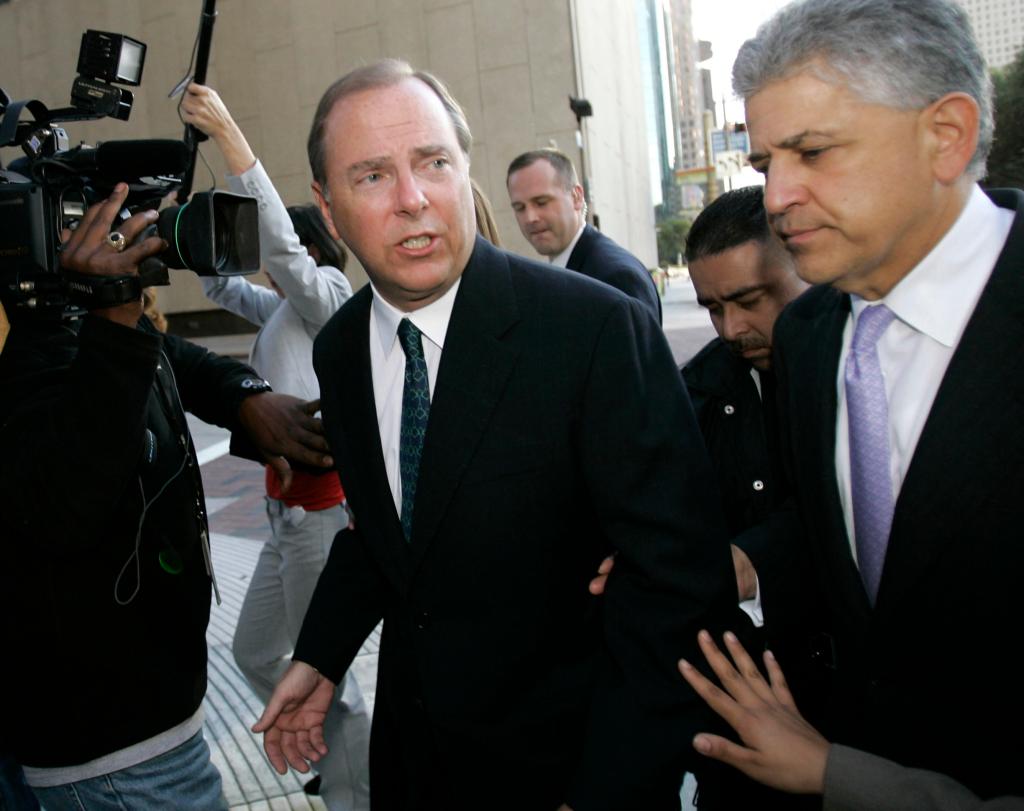WASHINGTON – The Supreme Court appeared troubled Monday by the selection of the jury that convicted former Enron CEO Jeffrey Skilling as well as the use of a federal fraud law against him.
Several justices appeared receptive to arguments by Skilling’s lawyer that he did not have a fair trial in Houston, Enron’s hometown, after the energy company’s 2001 collapse that cost thousands of jobs and billions of dollars.
Amid concern that the trial judge spent too little time questioning prospective jurors, Justice Stephen Breyer said, “I’m worried about a fair trial in this instance.”
Skilling was convicted in 2006 on 19 counts of conspiracy, securities fraud, insider trading and lying to auditors. His lawyers are hoping for a new trial.
He also is contesting his conviction under the federal fraud law making it a crime to deprive shareholders or the public of “the intangible right to honest services.” Critics say the law is vague and unfair.
Justice Antonin Scalia, the court’s most vocal critic of the law, said it sounds to him as though the law says, “It’s a crime to do any bad thing.”
But Justice Department lawyer Michael Dreeben said Skilling betrayed the trust of Enron shareholders by lying about the company’s health and by selling a half-million shares of stock, netting $15 million a few months before Enron went bankrupt.
Skilling “misused his official position,” Dreeben said.
Sri Srinivasan, Skilling’s Washington-based lawyer, focused much of his argument on the jury issue. Skilling sought to have the trial moved out of Houston, but the judge turned him down, and a federal appeals court backed that decision.
Three-fifths of those initially questioned as potential jurors reported they could not set aside their prejudice or anger against Enron, or were unsure if they could, Srinivasan said. The other key factor, he said, is that jurors would feel pressure to convict Skilling because they knew their neighbors and colleagues were expecting it.
He said the trial of Skilling and former Enron chairman Kenneth Lay, who has since died, was a rare case that needed to be moved out of Houston “because of the degree of passion and prejudice in the community.”
Breyer and Justice Sonia Sotomayor, the only court member with experience as a federal trial judge, seemed especially bothered by the questioning of one potential juror who reported that she herself lost $50,000 to $60,000 in the Enron debacle.
The judge did not immediately disqualify her. Indeed, Skilling’s lawyers used one of their limited challenges to make sure she did not become a juror.
“How can we be satisfied that a fair and impartial jury was picked when the judge doesn’t follow up when the witness said, ‘I’m a victim of this crime,’” Sotomayor asked.
Copy the Story Link
Send questions/comments to the editors.



Success. Please wait for the page to reload. If the page does not reload within 5 seconds, please refresh the page.
Enter your email and password to access comments.
Hi, to comment on stories you must . This profile is in addition to your subscription and website login.
Already have a commenting profile? .
Invalid username/password.
Please check your email to confirm and complete your registration.
Only subscribers are eligible to post comments. Please subscribe or login first for digital access. Here’s why.
Use the form below to reset your password. When you've submitted your account email, we will send an email with a reset code.